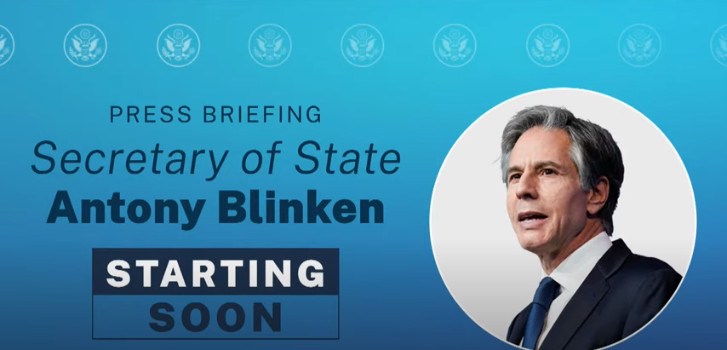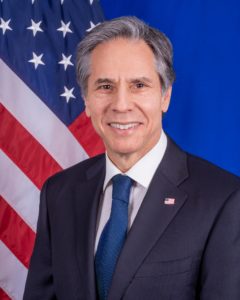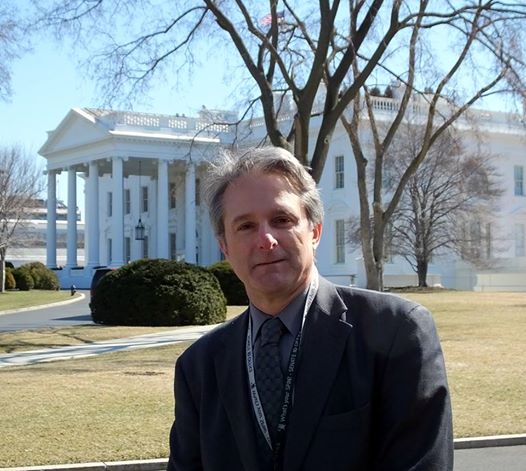Voice of America and Ukraine: As Putin Threatens, VOA Misses Opportunity to Carry Live Blinken Message to Russian People
A Commentary
By Dan Robinson
On Wednesday, March 2nd, the Voice of America issued a press release saying that it has been warned by the Russian government that Moscow intended to block VOA’s Russian language news website, www.golosameriki.com, unless it removed coverage of Russia’s invasion of Ukraine.
The press release provided a number of specific details of the threat by the Russian media regulator, Roskomnadzor, which claimed the news site “contains false messages about terrorist attacks or other kind (sic) of information of public concern.”
There were a number of other quotes from the threat by Moscow, which has been cracking down on Russian and foreign news organizations. And the VOA press release noted that the website of Current Time, which is a joint production of VOA and Radio Free Europe/Radio Liberty, was also targeted.
With great fanfare, the acting director of VOA, Yolanda Lopez, said “The Russian people deserve unfettered access to a free press and, therefore, we cannot comply with the Roskomnadzor’s request.”
VOA is a part of the U.S. Agency for Global Media (USAGM), formerly called the Broadcasting Board of Governors (BBG). USAGM is an agency of the federal government and portrays itself as being just another media organization, like CNN and MSNBC.
But the agency is actually part of the executive branch of the U.S. government, something its journalists like to forget, and is also an integral part of the soft power projection tools of the United States.
What’s interesting about this press release is that it came on a day when VOA itself squandered, to put it mildly, an opportunity to carry live a news conference by U.S. Secretary of State Anthony Blinken.
This wasn’t just any news conference. Blinken, who was preparing to depart on an overseas trip to visit NATO countries, including Poland and Baltic nations, delivered some very tough messages in his remarks and responses to reporter’s questions.
A look at VOA’s English website – its main page as well as a page devoted to the Ukraine crisis called “Flashpoint Ukraine” found only existing stories, but no Blinken. UPDATE: The VOA Russian Service reported to us later that it carried the Blinken news conference live with simultaneous translation.
A small video window (unstable and often frozen) was a live feed from an event where President Joe Biden was to appear but didn’t until some time later.
Why did news and content managers at VOA decide to leave this live window up on the main VOA worldwide English news website for such a long time without switching to a live event at the State Department where the administration’s chief foreign affairs official was speaking?
We don’t have an answer to that, but will observe that the failure recalled numerous previous examples in recent years of VOA being asleep at the switch on major breaking news right here in DC.
And here’s what’s worse about this: Blinken, at one point in his remarks, actually addressed comments to the people of Russia. So, these remarks were instantly seen across the globe by anyone watching CNN, MSNBC, FOX, and others. But NOT – by the Voice of America.
The agency that has consistently ranked as among the worst in the federal government has recently issued press releases about what it claims are sharp increases in use of USAGM content during the Ukraine crisis. It has had three staff members on the ground in Ukraine.
When it comes to coverage decisions, one has to wonder why this Blinken news conference somehow didn’t meet the agency’s standards for live coverage.
Alas, the failure to carry the Blinken news conference matters not, because the reality is that despite the agency’s boasts that it remains a vital information source, on Ukraine it really pales in comparison with coverage by CNN, MSNBC, FOX, BBC, and Sky News (UK).
That’s where you can depend on seeing virtually every live event, rather than waiting for the stuck wheels of a federal agency newsroom to turn just enough to cough up remarks by a secretary of state, or other U.S. officials.
A factoid: Voice of America employees do very well when it comes to salaries on the federal pay scale. Top-level executives draw $170,000+ with SES executives often making more. Even many lower to mid-level journalists – particularly those in VOA’s central newsroom and language services – make $100,000 or more.
It’s great work, if you can get it, and the salaries are far higher than will be found in the radio/broadcasting field.
So, one has to wonder about the place when the simple challenge of recognizing that a news conference by a secretary of State, amid one of the worst international crises since the Cuban missile crisis . . . should be covered live….well, seems to be a challenge for VOA News.
One online reviewer of VOA, who had worked in the organization for two decades, put it this way, in a review that can still be seen on Glassdoor titled: Great mission, but overpaid and widely under-skilled”
“VOA is, by and large, NOT a journalistic institution any longer despite its Charter . . there are pockets of talent, but management pretty much ignores or misdirects staff,” the reviewer said.
“Worse still,” the ex-employee continued, “[management] allows substandard employees to continue in their jobs, with several SES and GS-15 (highest pay level on the federal job scale) found to [be messing] with the books.
“The place must be scrapped, and re-imagined with serious journalists who are skilled and work with integrity,” the reviewer went on. “Honor your fat taxpayer salaries by taking your job seriously — and stop acting like everything is great when the place is falling apart. Take the mission seriously; take pride in being paid by American taxpayers.”
Under “PROS” the reviewer said: “Rewards incompetence so you don’t have to do much to keep your job.”
One has to wonder if that ex-VOA employee had a point. In the days of the first Cold War (we’re certainly in another one now with Russia) VOA’s failure to carry the Blinken remarks live would have been more unthinkable.
Then, before the Internet and phones and social media, broadcasting by VOA, BBC, and numerous others really did matter when it comes to ensuring that the words of U.S. officials made it to intended audiences.
Not so much anymore. VOA did not become the kind of global 24/7 television force that BBC did. It has struggled in the digital realm for years, though USAGM bureaucrats like to claim otherwise.
Shortwave broadcasting, as a key method of transmission, has dwindled though USAGM makes a show of announcing new programming and language broadcasts when there are global crises.
As many listeners to VOA frequently note, the outlet is often heard playing music (particularly on its programs to Africa) when breaking news is happening, such as presidential news conferences or important statements, while BBC routinely carries that same breaking news live.
So, it would have been nice if Blinken’s words – again, words that he specifically intended to be heard by Russians – had been live on VOA. But where VOA is concerned, it actually may no longer matter, and certainly didn’t when Blinken was speaking.
He didn’t need VOA to get his words to Russia.













